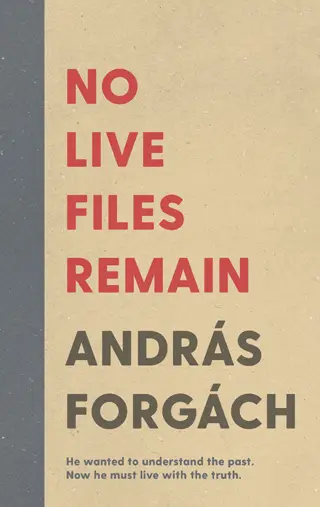No Live Files Remain by András Forgách – Review

By Barney Bardsley
Imagine this. You have a glamorous, energetic, gifted mother. She is a nurse. She is an organiser. She is a force of nature. She works like a demon to support her fragile and mentally unstable husband, and her bunch of wayward offspring – including you, an emergent intellectual in the difficult, closed-down world of communist bloc Hungary, in the 1970s and 80s.
You adore her, with an almost oedipal passion, this “irredeemable and yet beautiful human being.” (Irredeemable? More of that later.) And you realise, when she dies of lung cancer in 1985, that “the death of a mother is a cosmic event.” Then, 30 years after losing her, a friend, who has been researching newly-released files from the secret services, breaks the news. Your mother, the effervescent Bruria Forgách, alias “Mrs Pápai”, was, from 1975, to her death ten years later, a government informer. And she was spying on everyone, for the regime you so vehemently opposed: including you, her dearly beloved son. So now you lose her, all over again… Worse, you lose your whole history too, your family memories, your human trust. And “Everything is now suspect, especially beauty.”
“Obvious target for the secret services”
Hungarian writer András Forgách’s new book, No Live Files Remain, is an astonishing, complex and courageous reaction, in literary form, to the real-life revelation of his own mother’s shocking double life. But, as he writes in the book, shocking though the news is for him, it is also a horrible commonplace, in the fallout from any totalitarian regime. Where a system relies on secrets and lies, to sustain its ideology, then it will stop at nothing, and no one, to feed the machine.
Among the people it goes for, as obvious targets, are the thinkers, the intellectuals – for they are the dangerous ones, the ones who spread dissent. And the people it uses, to do its dirty work, are often, in the first instance, idealists and revolutionaries. The ones who believe in making a better world: and who will stop at nothing in helping that happen, even if it includes an almost wilful ignoring of the facts and conditions on the ground. The paradise illusion.
 Forgács’s formidable mother, Bruria, was one such idealistic individual. Born of a Jewish family, in the former Palestine (under British mandate), she became a fierce anti-Zionist and card carrying communist, from the outset of her adult life. She wanted to live somewhere that reflected those views: and the socialist state of Hungary fitted the bill. Her loyalty to her new country was total. She became an obvious target for the secret services, who used her family connections back home, and her local knowledge of the area and its people, to gather information and ammunition against the Israeli government.
Forgács’s formidable mother, Bruria, was one such idealistic individual. Born of a Jewish family, in the former Palestine (under British mandate), she became a fierce anti-Zionist and card carrying communist, from the outset of her adult life. She wanted to live somewhere that reflected those views: and the socialist state of Hungary fitted the bill. Her loyalty to her new country was total. She became an obvious target for the secret services, who used her family connections back home, and her local knowledge of the area and its people, to gather information and ammunition against the Israeli government.
“A sordid, unforgiving nowhere”
Writes Forgách, “My mother took a blind nationalism – this is how she saw Zionism – and confronted it with another sort of blindness, the ideology of the Soviet Empire.”
In a book split into three tightly-packed parts, the first a fictionalised account, then a cycle of poems about his parents, and finally, a stark and agonised piece of memoir – which quotes verbatim from the secret files on his mother, and her own submissions to her handlers – Forgách interrogates, with unrepenting intensity, the implications of such a life as his mother led. What was the cost, to her family, to those she betrayed, to herself?
The answer, clearly, is high. And perhaps the greatest victim of all, was Bruria Forgách herself. In blind adherence to an idea – a dream – of equality, and a better world, she found herself in a sad and lonely place, a sordid, unforgiving nowhere. “’I don’t have a mother tongue’, she said sometimes, with a masochistic smile. I don’t know Hebrew properly any more, and I never really learned Hungarian…’ Between two homelands into quicksand… Between two reasons, two treasons. And life is suddenly over.”
“Compelled to speak his truth”
The most chilling section of the book, is where Bruria is persuaded by her handlers, not just to file reports on Israel, but to monitor writers and activities inside Budapest itself. With horrifying naivety, she is persuaded to let operatives into her son András’s flat, ostensibly to spy on the building opposite, where a well-known dissident is said to be staying. But in fact it is her own son they are monitoring. And she literally opens the door for them to do so. Forgách describes her imagined, pitiful attempts to hide the samizdat pamplets littered about the place – stuffing them into an old suitcase on the top of a bookshelf, in some kind of futile and motherly protective gesture. “There she stood, in the stirred-up dust, gasping for air and bitter.”
It is hard to fathom, how András Forgách found the strength of mind to write this book. Moreover, how he manages to suspend judgement, how he can still openly and unashamedly love his treacherous mother. Inevitably, he has faced criticism for doing so, from within his own family, and beyond. But, as he has said in interviews since the book’s publication – Hungary, under the current control of the hawkish and right wing Viktór Orbán, with censorship of the press, and tight monitoring of all public media, faces a threat of a different political colour these days, but with the same disturbing implications for liberty and free speech. He therefore has felt compelled to speak his truth, and, in a fascinating and brilliant account, densely written, and skilfully rendered into English by translator Paul Ochváry, he has done so. The result is powerful, unforgettable and – even at many removes – quite devastating to read.
‘No Live Files Remain’ by András Forgách, trans. Paul Olchváry is published by Simon & Schuster, hardback £14.99









